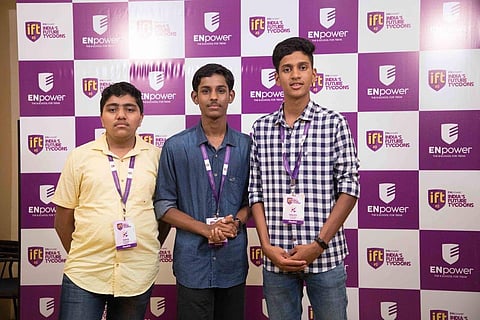

When Prajwal Erappa, Taran N and Suhas BG from Mysuru won ENpower India’s Future Tycoons Season 2’s grand finale, they were over the moon for all their hard work had finally paid off so handsomely. And why shouldn't they be? After all, these smart ninth graders from Kendriya Vidhyalaya, Mysuru just found an eco-friendly solution to overcoming India's prevailing water crisis. Their prototype extracts activated carbon from plastic waste and uses it as a purifier to clean our rivers and lakes. Now, how cool is that?
It was when Prajwal and his friends were helping some seventh graders in their school prepare for a quiz that they first read about anthracite and bituminous coal. "We all know that coal has high carbon content. I understood that anthracite coal has the same number of carbons as polyethylene (plastic) and in both cases, the high carbon content can be converted into activated carbon. In principle, it was easy to formulate the idea, but we took more than 60 hours to extract the activated carbon and check if it really purifies water. And we're happy to report that we were successful in our experiment," Prajwal says.
So, what did they have to do to extract the activated carbon? Prajwal explains, "First, we integrated the PET (Polyethylene terephthalate) pieces and sulfuric acid for 24 hours at 85° Celsius. This was our carbonisation experiment with PET bottles. Then, we activated the polyethylene terephthalate in the furnace with an inflow of 100 ml nitrogen per minute which then activated the carbon. After the carbon was activated, we washed it thoroughly with 0.1 molar weight of sodium hydroxide and rinsed it with lukewarm water. We packed the activated carbon and used it to test the purification process."
This young boy and his teammates, who did their fair share of research on carbon content, state that the use of activated carbon to purify water is a traditional method. "By applying this method, you are tackling two big and prevalent issues — plastic pollution and water crisis. But we took almost 10 months to find a solution like this. We started working on this idea in May 2019 and by November, our experiment was ready for demonstration," says Prajwal, who is eager to convert this idea into a business model.
According to their research, activated carbon is an instant water purifier. Explaining how their idea is unique, Prajwal says, "We have all watched those advertisements where companies demonstrate how they purify water. The specialty of our experiment is that we are using activated carbon obtained from plastic. Our business model is that we want to import tonnes of plastic waste from different countries and charge them a certain amount for it. Once we extract activated carbon from the plastic, it can be used for the purification of water. The purified water will be supplied to people for free. The carbon is again reactivated and supplied to the cosmetic industries. Because these industries use it as raw material, they need to pay us for it."
When we ask Prajwal if there is enough plastic to generate activated carbon to purify all the water in the world, he quickly says, "Absolutely! India alone produces 80,000 tonnes of plastic waste per month. I know it is an alarming number. According to our estimate, in 2020, India's packaged drinking water requirement will be 36 billion litres of water. But by employing our idea, we can purify 220 billion litres with 80,000 tonnes of plastic."
Here is how their business model can generate profits from plastic:
* They will charge cosmetic industries Rs 45 per kg for activated carbon
* The price of PET bottles imported from other countries will be at Rs 20 per kg
* Total revenue earned by selling the activated carbon to industries will be an estimated Rs 81.6 crore
* The total profit gained from one cycle will be Rs 105.6 crore
